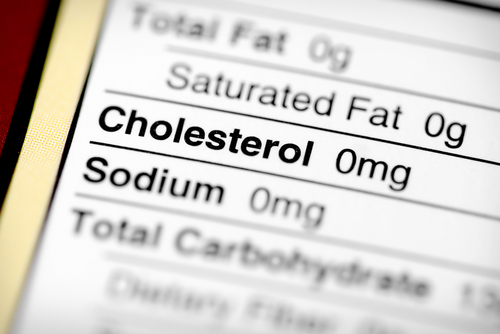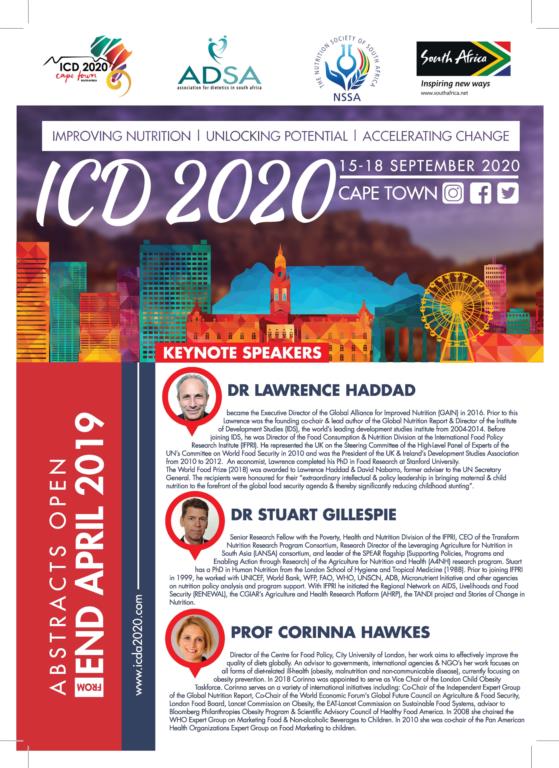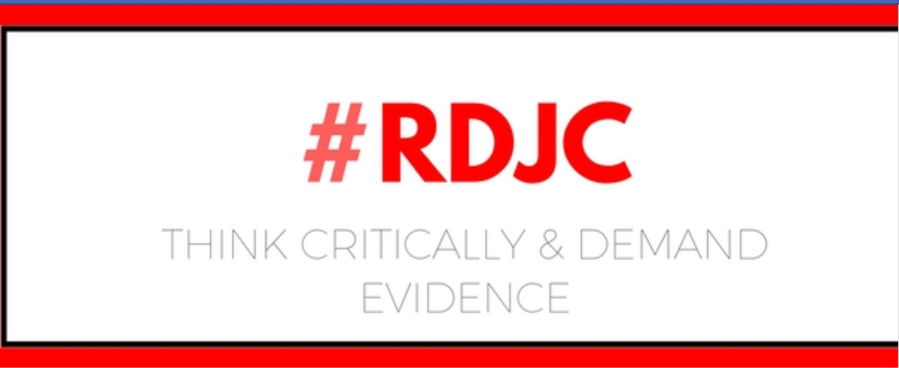PEN eNews 8(5) April 2019
PEN
® eNews is a monthly e-newsletter shared with the global PEN Community and created to help dietitians position themselves as leaders in evidence-based nutrition practice. In addition, users of the PEN System will find articles on the new evidence, resources and features available and how to maximize one's use of PEN.

Evidence is Never Enough
Yes, you heard me correctly. While I continue to champion evidence-based practice and believe strongly that we can all benefit from notching up our critical thinking, and spending some time enhancing our skills in the areas of finding and appraising best evidence, evidence is never enough.
Understanding where someone stands on a health issue, what is important and why they feel a certain way about that health issue is critical for dietitians wanting to dispel misinformation and provide relevant and evidence-based care to their clients.
This was really brought to life for me in a TedxUW Talk presented by dietitian Andrea Hardy, entitled: Quit Killing Human Connection With Science: Making Patient Care Meaningful.
I want to borrow from Jerry Maguire and say Andrea, you had me at “Science is my Superpower”. Right from the beginning, I was intrigued, then entertained by Andrea’s skillful delivery and finally inspired by her passion for making science meaningful for her clients. Andrea uses humour, stories and asking questions to create the connection with her clients that helps them be critical thinkers and perhaps more open to new or different evidence. Set aside 20 minutes and listen to Andrea Hardy’s TEDxUW talk!
I sometimes hear the critique that evidence-based medicine places too much emphasis on evidence, isn’t practical or doesn’t take the lived experience of the client into account. And that may be true in some instances but more and more, clinical practice guideline (CPG) developers also encourage us that to be effective, to really influence health outcomes, we must always consider the preferences and values of the communities we are hoping to influence, be they individual clients or groups or communities. In the GRADE approach to developing CPGs, the importance patients place on specific outcomes of interventions is used to assess balance of benefits and harms of a treatment or intervention and can impact the direction and strength of a guideline recommendation. It isn’t always obvious how a group or individual feels about a particular intervention. Patient values can be influenced by geography, age, religion, socioeconomic factors, education among others. While this aspect of CPG development is essential, it is hard, and we’re still learning how best to capture it.
See: Using patient values and preferences to inform the importance of health outcomes in practice guideline development following the GRADE approach for more information. PEN evidence analysts also consider patient values in defining the recommendation for both the traditional PEN process questions and the PEN GRADE questions.
In this issue of PEN eNews 8(5), we:
- See what’s new in the PEN database
- Learn what every dietitian needs to know about advocacy
- Review some of the latest PEN Trending Topics
- Find out more about Summary of Recommendations and Evidence tool
- Hear from a third-year nutrition and dietetic student about the Power of PEN
- Celebrate HON recertification
- Receive an invitation to ICD 2020 in Cape Town
Enjoy PEN eNews 8(5)!
References:
- Zhang Y, Coello PA, Brożek J, Wiercioch W, Etxeandia-Ikobaltzeta I, Akl EA et al. Using patient values and preferences to inform the importance of health outcomes in practice guideline development following the GRADE approach. Health Qual Life Outcomes. 2017;15:52. Published online 2017 May 2. doi: 10.1186/s12955-017-0621-0PMCID: PMC5412036. Available at: https://www.ncbi.nlm.nih.gov/pmc/articles/PMC5412036
A Publication of the PEN® System Global Partners, a collaborative partnership between International Dietetic Associations. Learn more about PEN.
What's New in PEN®
Click on the two links below to see MORE of the new and updated content, tools and resources and the latest Trending Topics in the PEN® System. Look for the new  and updated
and updated  symbols in PEN® System to see more new and enhanced content!
symbols in PEN® System to see more new and enhanced content!
Advocacy is part of every dietitian's role. We advocate for our clients, vulnerable individuals and populations, the public, our profession and a number of other individuals and groups. Our advocacy efforts may be integrated into our day to day work or part of an organization's strategic plan. It's important for dietitians to engage with stakeholders and decision-makers to influence change. The PEN Knowledge Pathway Advocacy/Public Affairs has been expanded and updated. Among the 13 Practice Questions, the following are highlights:
Looking for a tool or resource on advocacy? See the Related Tools and Resource section. Use the "Audience," "Country" and "Language" tabs to narrow your search.
Revisiting Trending Topics
In this issue of PEN eNews, we wanted to highlight our
Trending Topics f

eature. Some of you may not be familiar with this feature and so we thought that by sharing some highlighted ones from the past couple of months we can demonstrate how this section in PEN can help you stay on top of key nutrition controversies, new research and complement the more detailed analysis you see in the PEN pathways. Trending Topics can be searched by using the
Popular Tags.
Why Are Journal Article Retractions Important to Practitioners?
Last year certainly saw its share of news headlines related to journal article retractions, including this one from the Canadian Broadcasting Corporation (CBC), Science: What Happens When Researchers Make Mistakes. Read more….
Gut Microbiota in Nutrition and Health
This article, on the role of the gut microbiota in nutrition and health, is another in the BMJ series of open access, peer-reviewed articles examining controversial nutrition topics where there are uncertainties in the evidence and debate among experts.
Another Study on Cholesterol, Eggs and CVD Risk
The study analyzed pooled data from six prospective studies covering a period up to 31 years and involving 29,615 men and women in the U.S. It reviewed self-reported intake of cholesterol-containing foods, including eggs, and identified a positive association with an increased risk of cardiovascular disease (CVD) and deaths from other causes.
It reviewed self-reported intake of cholesterol-containing foods, including eggs, and identified a positive association with an increased risk of cardiovascular disease (CVD) and deaths from other causes.
Here are two analyses of the study…
DRI Updates for Sodium and Potassium
National Academies of Sciences, Engineering, and Medicine issued a new report titled, Dietary Reference Intakes for Sodium and Potassium. Read more…
The Association Between Ultra-Processed Food Consumption and the Risk of Mortality – What is the Real Deal?
Another observational nutrition study is making headlines around  the world (1-3) but is also raising concerns about the failure of news stories to address the significant limitations of the study.
the world (1-3) but is also raising concerns about the failure of news stories to address the significant limitations of the study.
A PEN Evidence Analyst offered this analysis.
How Do I … Find out more about the Summary of Recommendations and Evidence tool?
The PEN Team is always seeking ways to make PEN more useful and efficient for users. Based on feedback and an internal review, PEN is pleased to introduce a new tool called the Summary of Recommendations and Evidence (SRE).
The SRE organizes all of the recommendations and evidence for the questions in a knowledge pathway by topic. It is a one-stop shop to find the topic's key practice points, including Recommendations and Graded Evidence. This replaces the Evidence Summary. (You can learn more about PEN terminology here.)
So far, PEN has developed 70 SREs. Here are some examples:
Written by Jane Bellman MEd, RD
Kerri Staden BSc, RD Dietitians of Canada
PEN® Resource Managers
The Power of PEN
As a third-year dietetics student one of the most helpful and valuable tools during my studies so far has been

PEN. PEN stands for ‘Practice Evidence-based nutrition’. It is a global collaboration between the British Dietetic Association, Dietitians Association of Australia and Dietitians of Canada. It is a resource for dietitians and student dietitians. Its content is written by dietitians for dietitians, which really keeps the focus relevant.
What is PEN?
PEN is a resource where you can find out about the most recent evidence-base on conditions, diseases and their nutritional management. As busy students it can be overwhelming trying to access and critically evaluate all the information which is out there. It can seem like there are not enough hours in the day for completing your assignments, let alone making sure you are basing them on the most current research. This is where PEN can be of great use to dietetics students. It explains disease and dietetic care in real terms, which helps give you the confidence to develop your clinical and dietetic knowledge base on your road to becoming an RD!
Advice for first-year students
If you are a first-year student, you may be facing your first assignments and perhaps feeling unsure of where to gain credible (and understandable) information; my advice would be – start at PEN! Access to PEN is free for BDA student members and I would highly recommend using it as soon as you can. The site is so simple to use. You only have to type key search words into the home page and you can start. The language in PEN communicates the science and dietetic management in a practical way. By your second and third year of study, PEN will really have proven its worth!
Empowering students
The evidence in PEN is summary-graded either by PEN’s own grading system in strength of evidence (from A-D) or by using the GRADE system (used by many other organisations such as NICE and WHO) which helps to develop your critical skills in evaluating the most recent research and evidence. It can sometimes be confusing for dietitians and the general population to trust the information (and misinformation) which is out there, and so it helps to have a source of reliable information to refer to.
With so many dietary fads cropping up all the time as well as new nutritional advice, you may find that patients or even friends and family start asking your opinion on whatever nutrition topic is in the news (think coconut oil, gluten free or the keto diet). PEN has a subheading for trending topics where it looks at what is being discussed on nutrition in the media and then looks at the evidence base. This really empowers you as a student to know what’s going on in your field, and what messages people are getting.
PEN for placements
On my first A placement, a good wi-fi connection and some time between ward visits meant that I could read through all the background information on PEN before visiting a new hospital department. During placement, the newness of each day and tackling new experiences can leave you quite overwhelmed, so it was a great help to be able to refer a trusted source, which gave the backgrounds of disease simply. Also during placement, it is likely you will see conditions or dietetic treatments you have yet to cover at university. This is where knowledge pathways come in useful. I spent some time shadowing a paediatric dietitian who worked with children who had recently been diagnosed with type 1 diabetes. Using the PEN knowledge pathway background information, I found out about carb counting and how it can be used as a meal planning strategy.
In this situation PEN gave me the confidence to go into new situations with a basic understanding of what is required from a patient and dietitian. Another helpful tip would be to check out the related tools and resources in the knowledge pathway. It is a great place to find information for group education sessions which you may need for university assessments.
As you progress through your dietetics degree another helpful section of PEN is the practice questions; these answer reallife clinical situations which you are likely to see in hospital placements. This gives you some clear grounding on the evidence base around current practice. A ten-minute scan of the update and reviews and PEN can really keep you in the loop of what is happening in the world of dietetics.
With over 20,000 PubMed nutrition citations added annually, it can seem an impossible task to keep up-to-date but PEN is a great tool to help you be the most informed student dietitian you can be.
Your future career
As aspiring dietitians we want to be well informed about the current research and be aware of trends that our patients or clients may be concerned with. PEN is a great tool to scan through current topics and these are updated and reviewed on a regular basis.
I have found using PEN invaluable. I can’t stress just how vital it is to student learning and progress. Using it regularly will help you throughout your future dietetic career and not just through your studies.
Written by,
Leah Paulden
3rd year Nutrition & Dietetics student
University of Nottingham
PEN eNews Editor’s note:The PEN system is used in universities around the world through
PEN Site licenses. Dr Judy Bauer has suggested that the PEN System can be used in university settings as follows:
- Key program reference for nutrition & dietetics
- Practice questions/answers
- Toolkits
- Professional & consumer resources
- Capstone courses - Evidence-based practice/Translational Research
- Evidence-practice gaps
- Training materials
- Developing content
- Demonstrating commitment to evidence-based practice
- Sharing PEN e-news
- Developing blogs, newsletters
Colleagues at Acadia University had this to say about how they use the PEN System to support learning:
“I love the student assignment guide – partnering with PEN on assignments like a Trending Topics Article Analysis gives learners the opportunity to apply concepts from class while contributing to professional knowledge translation. I see this as a significant benefit not just to their learning, but their professional development as well.”
Sarah Campbell Bligh (former) Faculty, School of Nutrition and Dietetics, Acadia University
“Students are required to locate relevant sources from peer-reviewed literature, grey literature, and PEN. I advise them that PEN should be their first stop. I have heard students ask so many times that I have lost count, “What did people do before PEN?”
Dr Catherine Morley, Professor, School of Nutrition and Dietetics, Acadia University.
PEN Website Receives International Recertification
Last issue we shared that we were preparing for our Health on the Net (HON) assessment. We

are pleased to share that the PEN System received its 5th consecutive
Certificate of Compliance.
HON is a non-profit, non-government organization dedicated to promoting credible health information on the Internet. To receive HONcode certification, a website undergoes scrutiny by HON officials and must comply with criteria established by HON HON certified sites receive the ‘HON Code of Conduct’ logo to identify certification status.
Cape town ICD 2020: Improving Nutrition/Unlocking Potential/Accelerating Change


Knowledge transfer events and resources for dietitians
Have a look at some of the blog posts, web articles and peer-reviewed articles that caught our attention.
Blogs posts and web articles:

The “aim is to provide a platform where Dietitians and Nutritionists with an interest in research can connect and debate the ins and outs, pros and cons and scientific & clinical value of recent journal articles.
Join us every 2 months for an #RDJC discussion to give us your thoughts on a chosen research article which will be posted here in advance. We will also chose some key critical appraisal questions to structure the discussion. The chosen date for each #RDJC will be posted in advance with enough time so everyone can read the paper and prepare themselves.
When you join the group please read our group 'Rules':
This is a closed group for nutrition and dietetic professionals and those interested in nutrition research from all over the world to participate in journal club sessions and critically appraise and discuss the latest nutrition-related scientific literature.
All discussions will be confidential as any client information will be anonymised and all discussions are held in a private and secure "e" environment.
Please note this group is independent and not affiliated with any professional organisation.”
Organizers: Alethea Donnelly RD (@aletheadonnelly), Anna Julian RD (@AnnaJulianRD), Annette Rugyendo RD (@Annette_RD), and Claire Pettitt RD (@Claire_Pettitt)
To apply to join: https://www.facebook.com/groups/1947271008868892/
Contact Us
Do you have comments, questions or feedback? Please contact us:
Jayne Thirsk RD, PhD, FDC
Director of PEN®
Dietitians of Canada
jayne.thirsk@dietitians.ca
Eleanor Johnstone PG Dip, BSc, RD
Policy Officer (Evidence-based Practice).
British Dietetic Association
globalpen@bda.uk.com
Sally Moloney APD
Public Relations & Marketing Manager
Dietitians Association of Australia
pr@daa.asn.au
PEN eNews
April 2019 Volume
8 (5)
A Publication of the PEN® System Global Partners,
a collaborative partnership between International Dietetic Associations.
Learn more about PEN.
Copyright Dietitians of Canada
. All Rights Reserved.